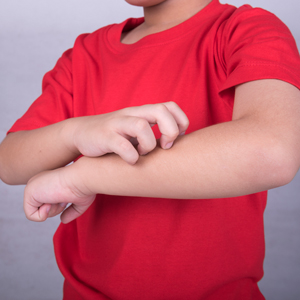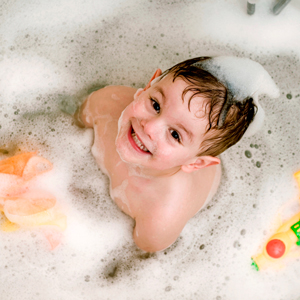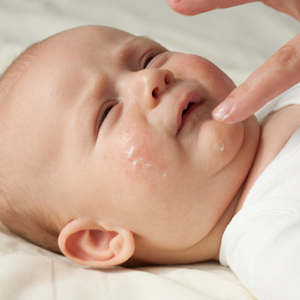There are very few things more frustrating to a parent than knowing their kids suffers from a condition that has no cure.
It is estimated that 35 million American’s suffer from eczema. Approximately 10% to 20% of our children have the condition, and of the adults who have this disease, 70% of them contracted it by the age of 5.
 Of its causes, “nobody is really 100% sure,” says Dr. Jonathan Tam, Medical Director of the Gores Family Allergy Center, at Children’s Hospital Los Angeles. “The one that is popular right now is a gene called ‘filaggrin’ and it’s really been mostly associated with eczema or atopic dermatitis. It causes barrier defects in the skin and that has also been associated with other allergic diseases like food allergy and asthma.”
Of its causes, “nobody is really 100% sure,” says Dr. Jonathan Tam, Medical Director of the Gores Family Allergy Center, at Children’s Hospital Los Angeles. “The one that is popular right now is a gene called ‘filaggrin’ and it’s really been mostly associated with eczema or atopic dermatitis. It causes barrier defects in the skin and that has also been associated with other allergic diseases like food allergy and asthma.”
Which beg’s the question, are asthma and eczema related? There must be a link, because so many sufferers of one have the other. “They’ve always been looking for a possible link between the two because it seems that kids start with eczema and end up with asthma,” Says Dr. Tam. “There’s been no clear link though, some people have tried to argue that eczema ends up causing asthma but that’s never been proven. Both the diseases are probably like mixed bags, meaning there’s some sort of genetic disposition along with environmental factors that cause the disease to come about.”
It would be wonderful to find a connection between the two that can lead to a possible cure, but it seems these diseases are parallel. “The way I imagine asthma, allergy, food allergy and seasonal allergies are roads that are all running in the same direction,” says Dr. Tam. “They’re their own street, but they can influence each other. If there’s traffic on one, the others might get crowded.”
 There are environmental factors involved too. “You see an up-kick of eczema based on western lifestyle,” continues Tam. “Allergic diseases seem to increase as society moves into a more industrialized, western-style life. There may be a role for things like diesel exhaust. There may be a role for just the decrease in infections, so as we get cleaner we don’t have the same number of infections, we’re not exposed to animal manure that may be modulating our system. Our diet has changed in such a way that the microbes in our gut have shifted.”
There are environmental factors involved too. “You see an up-kick of eczema based on western lifestyle,” continues Tam. “Allergic diseases seem to increase as society moves into a more industrialized, western-style life. There may be a role for things like diesel exhaust. There may be a role for just the decrease in infections, so as we get cleaner we don’t have the same number of infections, we’re not exposed to animal manure that may be modulating our system. Our diet has changed in such a way that the microbes in our gut have shifted.”
But just because we don’t know its causes and have no cure, does not mean that we can’t do things to help us manage the situation for our children. “The most frustrating thing about eczema is that there is no cure,” says Dr. Tam who also has children who suffer from the disease. “We know how to make it better, but all those things that make it better are just work. It takes a huge toll on families because it’s just exhausting. As soon as things get better you want to be able to relax, and as soon as you relax eczema will flare right up again.”
1. Use a good Moisturizer
“The first is good skin hygiene,” says Dr. Tam. “Use a moisturizer multiple times a day, any one is fine, the oilier is actually the better. I usually tell patients, things that come in jars are better than things that come in pumps. A cream or ointment is probably best they will absorb and stay on the skin better. Probably the best thing would be petroleum jelly or vaseline—if you can tolerate a grease-ball running around your house then that’s probably the best thing. Vanicream is another one I like, it’s the one exception to the pump rule, it comes with a pump but it’s a cream.”
2. Keep your Skin Clean
 “Keeping the skin clean and bathing is the next one,” says Dr. Tam. “Keeping the skin clean and baths do two things: (1) Your skin will absorb a certain amount of water while you are sitting in the bath provided you don’t dry it too thoroughly after you get out of the bath. (2) It also cleans and prepares the skin for the things you put on it.”
“Keeping the skin clean and bathing is the next one,” says Dr. Tam. “Keeping the skin clean and baths do two things: (1) Your skin will absorb a certain amount of water while you are sitting in the bath provided you don’t dry it too thoroughly after you get out of the bath. (2) It also cleans and prepares the skin for the things you put on it.”
3. Don’t be afraid of Topical Steroids
“I think there’s a fear of using topical steroids out there and I totally understand it,” says Dr. Tam. “People don’t like those medicines and there’s a lot of connotation to using steroids. My counter argument is well, ‘this is going to make your child’s skin better.’ We just have to be able to use the medicine within the right bounds and know when to stop. Underusing it is almost as bad as overusing it in a lot of ways because you’re not helping your child sleep better or feel better.”
4. Take a Bleach Bath
“Another thing that drives eczema is skin colonization to certain bacteria,” says Dr. Tam. “There’s bacteria all around us you know, we live in a world of bacteria. The bacteria that lives on our skin that is regular is what we call ‘staphylococcus epidermidis.’ In kids with eczema, they have a different staph on their skin that makes it even worse. It irritates the skin and dries the inflammation. It’s a horrible cycle. Controlling that bacteria is another way of controlling eczema. A lot of people have started bleach baths for controlling that bacteria on their skin, three times a week. You put a third to a fourth of a cup of clorox in a full bathtub, three times a week. That will decrease the bacterial load on the skin.”
5. Decrease Stress In The Child’s LIfe
 “Stress plays a role,” says Dr. Tam. “Because what happens is often times when kids are stressed, they itch more. You’ll see this in lots of kids that have eczema.”
“Stress plays a role,” says Dr. Tam. “Because what happens is often times when kids are stressed, they itch more. You’ll see this in lots of kids that have eczema.”
6. Be Healthy
There’s no known thing that adults can do to prevent asthma or eczema in their children. But there are lifestyle choices that might help. “There’s nothing definitive, but try to eat a diversified diet full of fruits and vegetables,” says Dr. Tam. It can’t hurt to be as healthy as possible by eating as healthy as possible.
7. Breastfeed
“Breastfeeding has some good data to it that may help prevent eczema or asthma for at least 6 weeks,” says Dr. Tam. “The official recommendation is 4-6 months.”
— The Gores Family Allergy Center was created with the generosity of Los Angeles financier and philanthropist Tom Gores and his wife Holly. They donated $5 million to build the center, that will focus on treatment for children with severe and life threatening allergies. To contact them visit CHLA.org.




